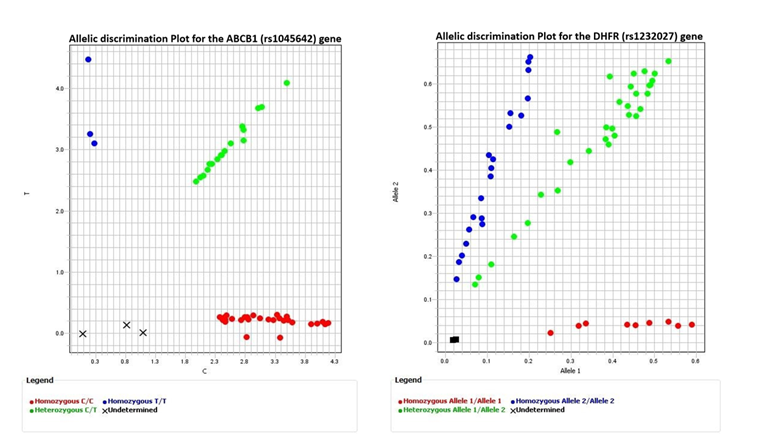Session Information
Date: Sunday, October 21, 2018
Title: Rheumatoid Arthritis – Treatments Poster I: Strategy and Epidemiology
Session Type: ACR Poster Session A
Session Time: 9:00AM-11:00AM
Background/Purpose:
Low dose methotrexate (MTX) is one of the most commonly used disease-modifying anti-rheumatic drug for rheumatoid arthritis (RA) with excellent efficacy and safety profile. However, it is implicated in significant inter-patient clinical response variability. Genetic polymorphisms have been suggested to play a role in this clinical response variations. In this study we investigated the association between key pharmacogenetics of methotrexate [ABCB1, DHFR] genes and the efficacy / tolerability of the drug among patients with RA at a tertiary center in Saudi Arabia. which may aid in an individualized risk assessment and prediction of treatment outcomes.
Methods:
A total of hundred patients with RA who received low-dose MTX therapy for at least six months were selected. Clinical and demographic characteristics were collected, Red blood cell MTX PG concentration were measured and common polymorphisms in folate pathway enzymes were performed through genotyping procedure. The efficacy of MTX in treating RA was measured by counting the number of tender, swollen joints, scoring the visual analogue scale (VAS), scoring modified Health Assessment Questionnaire (mHAQ).
Results:
The allelic frequencies of rs1045642 were 76.8 % for C, 6.0% for T, and 17.2 % for C/T, while, the allelic frequencies of rs1232027 were 50.9 for G/A, 32.5 % for G, 16.6 % for A. The study did not demonstrate any association between the polymorphism in ABCB1 gene and either toxicity or efficacy of MTX, while revealed an association between (rs1232027) polymorphism in the DHFR gene and certain adverse effects which are; nausea, lung infection, skin nodules, menstrual irregularities, oral ulcers in patients with RA (P<.05). In this study, we did not find a correlation between MTX dose and plasma level. Moreover, MTX plasma level was not correlated with toxicities detected in patients on MTX. On top of that, ABCB1 (rs1045642) and DHFR Gene (rs1232027) polymorphism were not associated with the risk of delayed elimination of MTX.
Conclusion:
The ABCB1 gene polymorphism is not a predictor of either toxicity or efficacy of MTX treatment in RA patients. while DHFR gene polymorphism might be a reliable predictor of toxicity to MTX treatment. So far, published data still inconsistent between variable studies. Further meticulously designed studies that include more genetic polymorphisms and larger sample size are needed for more accurate results that lead to further integration of pharmacogenetics into clinical practice and better outcomes.
|
|
GG
|
GA
|
AA
|
Pearson Chi-Square
|
|
Nausea
|
71.4%
|
14.3%
|
14.4%
|
0 .029
|
|
Hair loss
|
48.1%
|
30.4%
|
21.4%
|
0.162
|
|
Photosensitivity
|
55.6%
|
22.2%
|
22.2%
|
0.209
|
|
Skin nodules
|
58.7%
|
28.7%
|
13%
|
0.006
|
|
Lung infection
|
33.5%
|
59%
|
7.5%
|
0.017
|
|
Menstrual irregularities
|
33.3%
|
40%
|
26.7%
|
0.057
|
|
Bone ache
|
53.2%
|
35.4%
|
11.3%
|
0.256
|
|
Deformity
|
60.1%
|
39.9%
|
0
|
0.294
|
|
Oral Ulcers
|
59.9%
|
29.9%
|
10%
|
0.027
|
Percentage of genotypes of DHFR Gene (RS1232027) in MTX-induced toxicities
To cite this abstract in AMA style:
Attar S, Hagrass M, Abuzenadah A, Fath Aldin O, Attar R, Al-Raddadi R, Sulaiman M, Aseri A. The Role of Genetic Polymorphisms on the Response to Methotrexate Variations Among Rheumatoid Arthritis Patients in Saudi Arabia [abstract]. Arthritis Rheumatol. 2018; 70 (suppl 9). https://acrabstracts.org/abstract/the-role-of-genetic-polymorphisms-on-the-response-to-methotrexate-variations-among-rheumatoid-arthritis-patients-in-saudi-arabia/. Accessed .« Back to 2018 ACR/ARHP Annual Meeting
ACR Meeting Abstracts - https://acrabstracts.org/abstract/the-role-of-genetic-polymorphisms-on-the-response-to-methotrexate-variations-among-rheumatoid-arthritis-patients-in-saudi-arabia/

